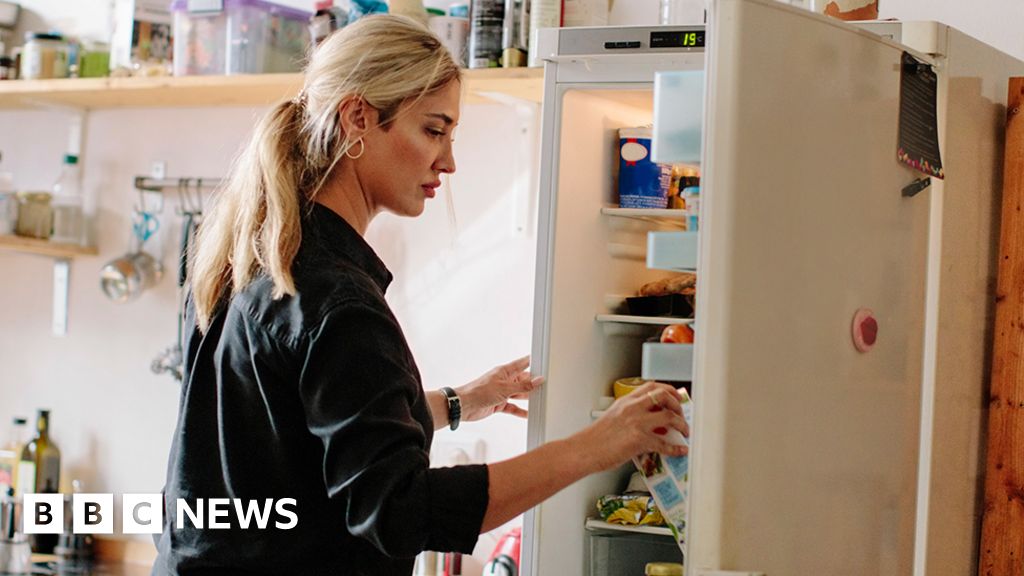Cost Of Living: One In Five Eating Food Beyond Use-by Date

Many people struggled to keep warm and ate food past its use-by date in the build-up to Christmas as prices continued to soar, official data shows.
Issues regarding the costs of heating and eating, and the impact on individuals, are shown in data from the Office for National Statistics (ONS).
Nearly one in five adults surveyed said they had eaten smaller portions and food beyond its use-by date.
Use-by labels have a date until when perishable food can be eaten safely.
The Food Standards Agency says that people should "never eat food after the use-by date, even if it looks and smells ok, as it could make you very ill".
It warns after this date, people should not eat, cook or freeze food, warning "you cannot smell the bacteria which make you ill".
Best-before guidance is different. It is for when the product should be consumed to get the best quality, taste and texture. A number of supermarkets have dropped the use of best-before labels claiming they create food waste when consumers could simply use their discretion instead.
Almost a quarter of those asked in the survey, conducted in the four weeks to 18 December, said they had occasionally, hardly ever, or never, been able to keep comfortably warm in the previous fortnight.
Rising prices
The ONS poll, based on responses from more than 4,700 people, suggests that the winter weather, energy bills and rising food prices were having a significant impact on health and wellbeing.
In total, around one in seven (15%) adults were somewhat, or very, worried their food would run out before they had money to buy more.
Over two-thirds (70%) of those who ran out of food in the previous two weeks, and could not afford to buy more, were also struggling with heating.
Some 41% of people on prepayment meters said they had struggled, at least occasionally, to keep warm.
Sarah Coles, senior personal finance analyst at investment firm Hargreaves Lansdown, said: "This bleak winter is taking a horrible toll on people's lives, and their health."
The cost of energy and the war in Ukraine have been key factors in the soaring cost of food.
Official data shows that food prices rose 16.8% in the year to December. Basics such as milk, cheese and eggs saw the largest increases.
Prices for sugar, jam, honey and chocolate, as well as soft drinks and juices, also jumped. However, price growth slowed for bread and cereals.
Overall inflation, which charts the rising cost of living, was 10.5% in the year to December - meaning a typical basket of goods and services rose in price by 10.5% in a year. The Bank of England's inflation target is 2%.
Your device may not support this visualisation
The latest data comes from a monthly survey which asks various, and changing, questions about winter pressures such as the cost of living. This means it is not necessarily possible to say whether issues, such as eating after a use-by date, has changed over time.
It also covers the issue of hospital waits, with the poll suggesting that 21% of adults reported they were waiting for a hospital appointment, test, or to start receiving medical treatment through the NHS.
The latest findings come shortly after a survey for the BBC indicated that a third of respondents who used credit to help get through Christmas and the holiday season said they were not confident about their ability to repay.
It suggested more than eight in 10 of those asked were worried about the rising cost of living, with some losing sleep over it.
But people are finding different ways to cut costs to pay their bills. A majority of respondents have been turning the heating down and lights off, or reducing their grocery shop.
From Chip War To Cloud War: The Next Frontier In Global Tech Competition
The global chip war, characterized by intense competition among nations and corporations for supremacy in semiconductor ... Read more
The High Stakes Of Tech Regulation: Security Risks And Market Dynamics
The influence of tech giants in the global economy continues to grow, raising crucial questions about how to balance sec... Read more
The Tyranny Of Instagram Interiors: Why It's Time To Break Free From Algorithm-Driven Aesthetics
Instagram has become a dominant force in shaping interior design trends, offering a seemingly endless stream of inspirat... Read more
The Data Crunch In AI: Strategies For Sustainability
Exploring solutions to the imminent exhaustion of internet data for AI training.As the artificial intelligence (AI) indu... Read more
Google Abandons Four-Year Effort To Remove Cookies From Chrome Browser
After four years of dedicated effort, Google has decided to abandon its plan to remove third-party cookies from its Chro... Read more
LinkedIn Embraces AI And Gamification To Drive User Engagement And Revenue
In an effort to tackle slowing revenue growth and enhance user engagement, LinkedIn is turning to artificial intelligenc... Read more

